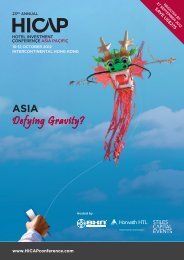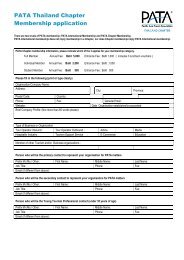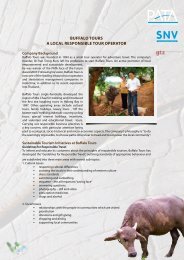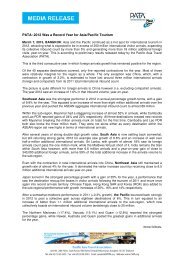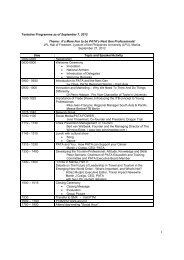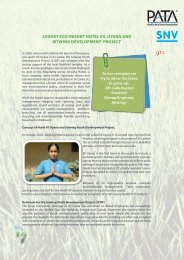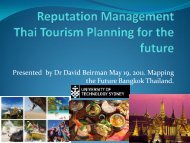The Governance of Tourism in OECD Countries
The Governance of Tourism in OECD Countries
The Governance of Tourism in OECD Countries
Create successful ePaper yourself
Turn your PDF publications into a flip-book with our unique Google optimized e-Paper software.
THE GOVERNANCEOF TOURISM IN<strong>OECD</strong> COUNTRIESAssociate Pr<strong>of</strong>essor Noel ScottSchool <strong>of</strong> <strong>Tourism</strong><strong>The</strong> University <strong>of</strong> QueenslandAustralia
Presentation outl<strong>in</strong>e• Chang<strong>in</strong>g role <strong>of</strong> government• Good governance• <strong>OECD</strong> member survey results• Current trends <strong>in</strong> governance• Examples• Policy responses• Issues for discussion
<strong>The</strong> chang<strong>in</strong>g role <strong>of</strong> government• Roles and competencies <strong>of</strong> government tourismorganisations are evolv<strong>in</strong>g;• Government policies emphasise competitiveness:– improv<strong>in</strong>g productivity and quality;– encourag<strong>in</strong>g <strong>in</strong>novation;• Better def<strong>in</strong>ition <strong>of</strong> roles and competencies;• Macro-policy environment favours collaboration:– policy development <strong>in</strong> conjunction with <strong>in</strong>dustry– an emphasis on sub-national decision-mak<strong>in</strong>g– whole <strong>of</strong> government approach
Good governance <strong>in</strong>volves:• A strategic view that focuses on relevant issues andproblems;• Pr<strong>in</strong>ciples <strong>of</strong> effective decision-mak<strong>in</strong>g such astransparency, accountability, <strong>in</strong>clusiveness, fairness;• An <strong>in</strong>tegrated (horizontal/vertical) – whole <strong>of</strong>government approach;• All legitimate stakeholders committed and activelywork<strong>in</strong>g together with the capacity to undertake the rolesand decisions required.
Challenges faced by National<strong>Tourism</strong> Adm<strong>in</strong>istrationsChallengesHorizontal and vertical tourismpolicy co-ord<strong>in</strong>ationF<strong>in</strong>ancial pressures facedby tourism public agenciesGreatestchallengeMajorchallengeTotal12 3 154 7 11External impacts3 4 7(economic, safety/security,natural disasters)Effective regulation 2 5 7Develop<strong>in</strong>g a reform agenda <strong>in</strong> tourism 0 1 1
Current trends <strong>in</strong> governance• Institutional change– Central tourism policy organisations (e.g. Japan)– New organisation structures (e.g. United K<strong>in</strong>gdom)– Rationalis<strong>in</strong>g Regional <strong>Tourism</strong> Organisations (e.g. Austria)– Decentralisation (e.g. Brazil)• Increas<strong>in</strong>g co-ord<strong>in</strong>ation– Across central government m<strong>in</strong>istries (e.g. Germany)– Central-regional (e.g. Australia, Canada, Italy)– Across regional governments (e.g. New Zealand)– Private sector/<strong>in</strong>dustry body <strong>in</strong>volvement (e.g. Germany, Hungary, Slovak,Spa<strong>in</strong>)• Chang<strong>in</strong>g role for central government– Innovation (e.g. Norway)– Regional development (e.g. Italy)– HR development (e.g. capacity build<strong>in</strong>g)• Strategy development to engage/co-ord<strong>in</strong>ate stakeholders
Example 2 – Co-ord<strong>in</strong>ation and<strong>in</strong>terface with <strong>in</strong>dustry• Germany– voluntary association <strong>of</strong> tourism organisations with local,regional and nationwide operations;• Hungary– Peak employer and employee associations;• Slovak Republic– seven most important nationwide associations <strong>of</strong> tourism;• Spa<strong>in</strong>– an advisory body which br<strong>in</strong>gs state, regions and prov<strong>in</strong>cescities,chambers <strong>of</strong> trade, employee unions, pr<strong>of</strong>essionalassociations.
Potential policy responses• Clear def<strong>in</strong>ition <strong>of</strong> organisational roles;• One peak <strong>in</strong>dustry association - conjugate representativebody;• <strong>Tourism</strong> strategy to engage and provide co-ord<strong>in</strong>ation -requires fund<strong>in</strong>g and communication;• Develop competent local actors - active ‘learn-by-do<strong>in</strong>g’programmes;• Dest<strong>in</strong>ation management organisations at thesubnational level;• Relevant data and analysis to evaluate policy outcomes.
For further <strong>in</strong>formation• Chapter 1 – <strong>Tourism</strong> governance <strong>in</strong> <strong>OECD</strong> countries• Chapter 2 – Evaluat<strong>in</strong>g tourism policies andprogrammes• Chapter 3 – Policy approaches to skills development<strong>in</strong> tourism• Chapter 4 – Policy and statistical pr<strong>of</strong>iles <strong>of</strong> 51<strong>OECD</strong>, EU and emerg<strong>in</strong>g tourism economies• Available at http://www.oecdbookshop.org/




